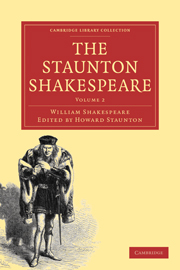Book contents
- Frontmatter
- Contents
- ALL'S WELL THAT ENDS WELL
- KING HENRY THE FIFTH
- AS YOU LIKE IT
- PERICLES, PRINCE OF TYRE
- TWELFTH NIGHT; OR, WHAT YOU WILL
- THE FIRST PART OF KING HENRY THE SIXTH
- THE SECOND PART OF KING HENRY THE SIXTH
- THE THIRD PART OF KING HENRY THE SIXTH
- TIMON OF ATHENS
- KING RICHARD THE THIRD
- MEASURE FOR MEASURE
- KING HENRY THE EIGHTH
- CYMBELINE
THE THIRD PART OF KING HENRY THE SIXTH
Published online by Cambridge University Press: 29 August 2010
- Frontmatter
- Contents
- ALL'S WELL THAT ENDS WELL
- KING HENRY THE FIFTH
- AS YOU LIKE IT
- PERICLES, PRINCE OF TYRE
- TWELFTH NIGHT; OR, WHAT YOU WILL
- THE FIRST PART OF KING HENRY THE SIXTH
- THE SECOND PART OF KING HENRY THE SIXTH
- THE THIRD PART OF KING HENRY THE SIXTH
- TIMON OF ATHENS
- KING RICHARD THE THIRD
- MEASURE FOR MEASURE
- KING HENRY THE EIGHTH
- CYMBELINE
Summary
This tragedy was first printed in its present form, in the folio of 1623. It is an enlarged and improved version by Shakespeare, of “The True Tragedie of Richard, Duke of Yorke,” &c. before adverted to, as that, we conceive, was an alteration and improvement by him of an earlier drama, the work of one or more of his contemporaries.
From the circumstance of Robert Greene's paraphrasing a line of “The True Tragedy :”—
“O, tiger's hart, wrapt in a woman's hide;”
when reflecting on Shakespeare, in his “Groatsworth of Wit,” 1592, and of some resemblances between passages in his acknowledged dramas and passages in “The True Tragedy,” it may be inferred that he had some share in the production of the piece or pieces, on which were based “The First Part of the Contention,” and “The True Tragedie of Richard, Duke of Yorke.” This deduction is strengthened by a passage in “Greene's Funeralls, By R. B. Gent.” 4to. Lond. 1594, a small tract of twelve leaves preserved in the Bodleian Library :—
“Greene is the pleasing Obiect of an eie;
Greene pleasde the eies of all that lookt upon him.
Greene is the ground of everie Painter's die;
Greene gave the ground to all that wrote upon him.
Nay, more, the men that so Eclipst his fame,
Purloynde his Plumes, can they deny the same?”
- Type
- Chapter
- Information
- The Staunton Shakespeare , pp. 397 - 456Publisher: Cambridge University PressPrint publication year: 2009First published in: 1859

